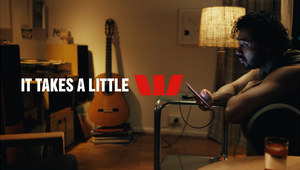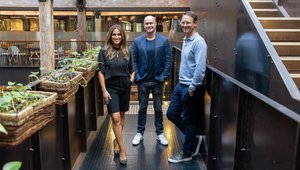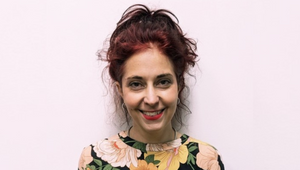
5 Minutes with... Jen Speirs

If there’s one fact to know about Jen Speirs in order to get a feeling for who she is as a creative, as a leader and as a human being. She’s still got the letter that her very first boss wrote her on her very first day. She takes it out every now and then. And it’s a document that has stayed with her, informing the care and passion she holds towards her own work – and the importance she places on supporting and protecting her team, giving them the space to be vulnerable, be open and free of self-censure.
Now the deputy ECD at Australian agency BMF, Jen has been working on big projects tackling issues like domestic violence and the gender pay gap. And she’s got no time for pessimism about the industry. LBB’s Laura Swinton caught up with her for a big old chat.
LBB> Where did you grow up and what kind of kid were you?
Jen> I grew up on a farm in the middle of New South Wales, so quite far from Sydney. I was one of four kids, I had an older sister, older brother and younger sister. It was all hands on deck; we all mucked in and basically spent all of our lives outside. I was also into debating and public speaking at school – I think what Mum and Dad were good at was supporting us in what we were interested in . They didn’t make us all do the same thing. It was good, we were all pretty happy kids.
LBB> What role did creativity play in your early life?
Jen> I’ve always written stories. At school we had to write a story every week and I was already writing so much that I would basically pick mine from my back-catalogue of what I’d already written. I wrote poetry, speeches. And I always had imaginary friends on the farm, I’d be creating forts and big cities out of dirt and sticks.
LBB> It sounds like the opposite of the over-stimulated tech existence of today!
Jen> We watched telly for maybe an hour a night and there was one channel. I sound like I’m a thousand years old! But we were out in the middle of nowhere, so it was about other kinds of stimulation than screen time. I look at my nieces and they’re so much more capable of things than I was at their age, that’s just the pay-off too.
LBB> You studied psychology and sociology at university. Do you feel like you draw from those in your work?
Jen> Indirectly it definitely does. I’m all about the individual, making sure that different people are represented. I want to know all about what’s behind you instead of taking people at face value. I think that goes back to our upbringing, where we were respected as individuals and not treated as cookie cutter and that does indirectly pay off. And with sociology, that’s all about the group dynamic. It’s definitely there and with the human insights part of creative, it’s important to think about where people’s heads are at, what’s the current zeitgeist.
LBB> What drew you to advertising?
Jen> I was nannying once, over the uni break ,and the family I was working for had a friend who worked in advertising. I thought, ‘oh my God, this is a place where you can be creative and earn money’. It was like a Christmas miracle. I think I was drawn to it after that.
My dad was the mayor of the small town we were from, and on Australia Day every year they’d bring down a national celebrity. It was very, very D-List because it was a small town. One year they had a lady who was Australia’s first heart transplant patient and her husband ran a massive advertising agency in Sydney. My mum rang me the next day and said she had this man’s business card. I went in, not to get a job just to be shown round the agency. The space looked creative, it looked like fun; an environment that I’d love to work in. I made it my life’s mission to get into advertising, and it wasn’t easy but I’m glad I did.
LBB> So you stumbled upon the industry – I hear that so much from people without that family connection. How much of an issue do you think this still is for the industry?
Jen> I think we’ve got to get better at that so we can get more people from different backgrounds and different socio-economic statuses into the industry, otherwise we’re just relying on people who have grown into it, who are familiar with it because of their family. Or they somehow stumble across it. The more people from different backgrounds we have in the industry, the better we’re going to be.
LBB> So what was your first job in the industry?
Jen> I launched myself as a product. I sent all these different agencies a letter saying I was a washing powder or something like that, with all the different benefits of having a Speirs-y on their team. I got a couple of calls and ended up getting a job at Ogilvy One. I was supposed to go in as a production assistant and at night I could work on briefs as a copywriter. A couple of weeks before I started, they called up saying things had changed and that I’d be coming straight in as a junior copywriter. I went in there and I was writing newsletters for builders and things like that. And I did AWARD School too. I felt like I was so lucky.
I remember my first boss, a really nice guy, wasn’t able to be there on my very first day so he wrote a letter for me. I’ve still got that letter – it was so well written because he was a copywriter. Things like, never forget you’re not writing for me, you’re not writing for James Hardy (who the client was), you’re writing for builders. Always remember who your writing for. I’m always pushing that and have to remind myself as well.
Another great piece of advice was ‘Don’t panic; you’ll be good or bad, but hopefully never ordinary’. Again I think that’s really good advice and I have remembered it and taken it with me.
The letter’s a little bit dog-eared and a little bit shabby now, but every now and then I’ll bring it out and go ‘yep’. It’s good advice.
LBB> Having had someone set you off on your very first day on that kind of footing, how has that influenced how you work with new people coming into the industry?
I just like to encourage people to be themselves, to give it everything and to just try. There are people further up the food chain, whether it’s me or someone else, who is going to worry about whether it’s right or wrong – they don’t need to worry about that. They have to be themselves and go for it. That’s why we have creatives at the table, we need them to bring their own spin to it. If they’re tempering themselves out of fear of what their boss is going to say, we’re only going to get half out of them. And they won’t like it either.
I have a few creatives that I mentor and I think that’s important for the industry. I’ll have random conversations with them and they’ll come to me and ask me questions about their career.
LBB> I read a piece you wrote about judging at Cannes and I was so struck by the passion you have for the work. Where does that reserve of passion come from – and is it important to balance out that passion with a sense of perspective? Or as a creative is it important to commit and is perspective something for other people to worry about?
Jen> I guess the passion comes from… well… this is what I’ve chosen to do so I may as well just go for it. And as I get more experienced, I want the industry to be as good as it can be as well. I’m not here to be complacent. I’m not here to do something half-arsed. What’s the point? The whole Cannes experience and the week that followed was a whole stark reminder of that.
But it’s grounded. I’ve never been the kind of person who only hangs out with advertising people or who thinks that advertising is the be-all and end-all. That balanced view of the industry is important to me – I’m from a pretty down-to-earth family so I’m kept pretty grounded on a daily basis.
LBB> You say you refuse to accept that the best ideas come from you or people who look like you – how do you put that into practice within the agency? And how do you check yourself for unconscious bias?
Jen> For me, I guess, I’ve always had to push around the edges to get into the industry and stay in the industry.
It does have to be conscious at an agency level. When we’re recruiting, we’ll have a look around, ‘are we as representative as we could be?’. But even then I’ve got to check my own self – why am I liking this work? You have to do it quite deliberately. We have quite good training at BMF, HR are all over it and every now and then I will do the Harvard Unconscious Bias online training. And we can always get better. I guess on a personal level I’m not doing it flawlessly but I’m trying.
LBB> And when it comes to diversity and inclusion, what are the particular nuances or contexts in Australia?
Jen> Certainly in the senior ranks, it still is gender. But the conversation’s happening and that’s obviously global, that issue. Ageism and keeping experienced people in the industry is a big one. I don’t know what the solution is to that, but we better solve it tout suite or I’ll be out on my arse as well! How do we get around that. I know that Cindy Gallop’s new thing is ‘disrupt ageing’ and it’s a big issue. We certainly have a young creative department in Australia and I suggest that that’s also quite universal.
It’s probably also socio-economic status for us and I’m sure we could be more racially diverse.
LBB> We’ve been talking about that so much – how much comes down to money? Young creatives are so much cheaper to employ – which is crap for them because cost of living is so expensive and so they get shafted, while the more experienced people can’t find anyone who values what they have to bring…
Jen> It’s a false economy because often the more experience people can get the work done quicker. They can navigate around feedback, they know what to push back on and what not to. Manage more of the client relationships, understanding why something needs to happen. It’s not about having no young people in there, though.
LBB> I guess they’re also setting up the younger teams for a fall because there’s no one to turn to for advice or to learn from…
Jen> We have lots of training, but the majority of what you learn is through osmosis. There’s no formal ‘that’s how you write that particular paragraph to that particular person’, it’s picking up smatterings of what you learn along the way and turning it into something new.
LBB> Looking at the industry, there are a lot of changes happening. Are you optimistic about the industry and the future for creative advertising?
Jen> I’m optimistic. Not because I think, ‘oh great we’ve found ‘it’ and we’ve landed on the perfect way of being and now this is going to last us until the end of time’. I think we’re changing at such a pace now and conversations are getting better. I think we’re trying to shake off these shackles of thinking, ‘this is the way that we’re meant to be as a creative or a creative department’. We’ve moved beyond that now and we understand that we have to be constantly changing. I think that I’m optimistic – I don’t know where we’re going to be in five years, but I think people will still need creative ideas to solve problems. And we’ll be geared for that and a bit more flexible.
When I look at the work that I’m resonating with, it’s just so varied. There’s just not one way to do things. A stamp in a passport. Our options? We haven’t even thought of them yet and that’s an exciting place to be. We’re pushing into social change and that’s only going to be a good thing.
Look at Gillette – apart from the ad itself, the conversation that it’s started has got to be a positive. There’s too much other stuff to get pessimistic about. I don’t want to be pessimistic about the industry that I’m in.
LBB> You’ve been in the industry for almost 20 years – what’s been your proudest achievement?
Jen> I worked on a Carefree campaign for Johnson & Johnson; they’re a family brand, very conservative. We did an above the line campaign and we had to do a social campaign. Essentially, the budget and the client's desire was to pretty much run the TV ad online but we knew we needed to talk to 14, 15 year olds. We pushed and fought and ended up creating these three characters which were just ridiculous. Harmony Freebush, Stefan Van Der Bloed and Fanny Glitterwinkle… So we didn’t walk away from the concept or the insight but we knew in order to work in that social environment we knew we needed to do something that would truly resonate with those guys. The conversations around that and getting it out the door were intense – but so right for them at the time. It was a pro-active effort from the team.
The other was Daughter Water. We got a brief to do a letter to send out to CEOs to get them to sign up to a gender pay gap assessment tool. And it was a government department so, again, they were quite conservative. The team was working with the planners to get the insight that CEOs make the most changes when they have a daughter – not from their wives or their daughters. We created daughter water about getting CEOs to have daughters, and we created this whole farcical campaign around it. And we sent bottles to thousands of CEOs. Getting that out was also something we’re really proud of.
LBB> What are you looking forward to in 2019?
Jen> I’ve got a couple of projects on the horizon. Working on them is awesome and, again, I’m in a zone that I’m not comfortable with so I’m loving that. It is a real experience, kind of career-changing. If the work comes off – and often great ideas don’t get realised for a variety of reasons – I’m just hoping it pays off and it’s really exciting to be part of. It’s a case of watch this space.
Towards the end of last year we did a project that I’m really proud of as well, the domestic violence campaign. It was a big launch and we’re getting started on the next iteration of that. The consequence of that working or failing are literally life or death for some people so it’s something I’m invested in.















